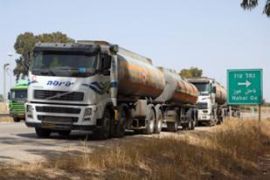UN suspends Gaza food deliveries
Humanitarian crisis deepens amid talks of impending truce between Hamas and Israel.
An emergency shipment of fuel for UNRWA lorries from within Gaza was reportedly intercepted on Thursday by angry strawberry farmers who needed the supplies for irrigation and refrigeration.
“It’s something that we’ve been warning about since early April, and that is what is so tragic,” John Ging, head of UNRWA in the Gaza Strip, told Al Jazeera.
“Now we’re at a standstill – we just don’t have the fuel to operate the trucks.
“We have the food, and we certainly have hundreds of thousands of desperate people who need it. But this is the situation tonight.”
‘Gaza first’
Israel has besieged Gaza since fighters from Hamas’s armed wing routed Palestinian Authority forces loyal to rival Fatah there in June.
Hamas, however, says “big progress” has been made in indirect negotiations with Israel towards a temporary ceasefire in the Gaza Strip, and the easing of the blockade.
|
“The key condition for this ceasefire is that Israel should re-open all the crossings … to lift the embargo on the Palestinian people”
Ghazi Hamad, Hamas spokesman
|
Ghazi Hamad, a Hamas spokesman, told Al Jazeera that a month-long deal would aim to begin improving the situation in Gaza first, and then expand to the West Bank as well.
He said: “I think the key condition for this ceasefire is that Israel should re-open all the crossings [into Gaza], especially the Rafah crossing, in order to allow people and goods to move in and out and to lift the embargo on the Palestinian people.
“Without opening the crossings, there will be no means for the ceasefire.”
In exchange, Hamas would agree to stop firing rockets into southern Israel and attacking crossing points.
David Chater, Al Jazeera’s correspondent in Gaza, said while Hamas and other Palestinian resistance groups in the Strip may agree to the deal, it remains to be seen what action Israel will take.
He said: “There are many difficulties involved on the Israeli side, [such as] who exactly will control the crossing points, especially at Rafah.
“There is a lot of talking still to do on the Israeli side before they accept these conditions.”
The preliminary deal aims to secure a one-month ceasefire, although reports from Cairo have said it might be extended to a year-long agreement.
‘Collective punishment’
Speaking a day earlier of the deteriorating humanitarian situation in Gaza, Robert Serry, UN special co-ordinator for the Middle East peace process, said it was “wrong for Israel to punish a civilian population for attacks” carried out by Palestinian fighters.
Twenty per cent of ambulances in the Strip are completely out of fuel, according to the UN, while another 60 per cent are due to run out of supplies in less than a week.
Fuel reserves at hospitals have, meanwhile, dropped below critical level and the central pharmacy has run out of fuel for refrigeration.
Serry said: “I call on Israel to restore fuel supplies to Gaza, and to allow the passage of humanitarian assistance and commercial supplies, sufficient to allow the functioning of all basic services and for Palestinians to live their daily lives.”
But he also called on Hamas “to immediately end attacks against the crossings, whether by it or any other faction or group”, to encourage the resumption of fuel deliveries.
“These attacks endanger both international and Israeli civilians, and cannot possibly contribute to Palestinian efforts to ease the blockade of Gaza,” he said.
UNRWA delivers aid to about 860,000 of Gaza’s 1.4 million population, with the UN World Food Programme delivering food and essential items to an additional 270,000.
